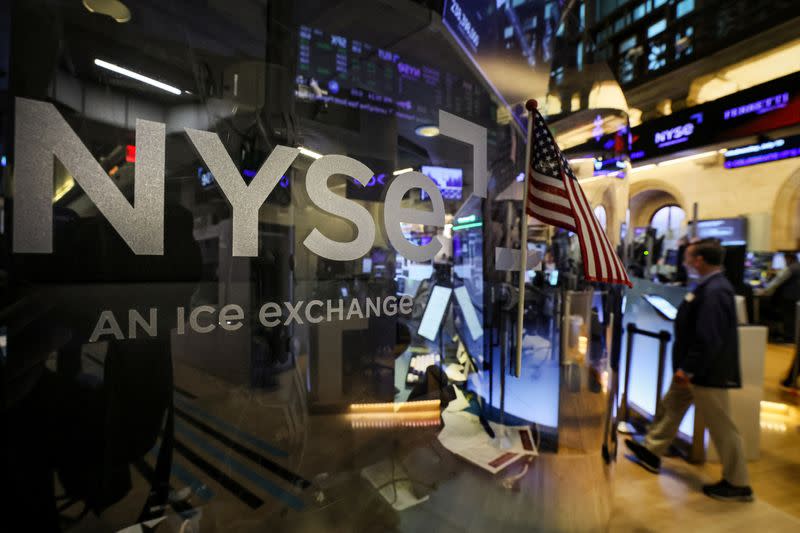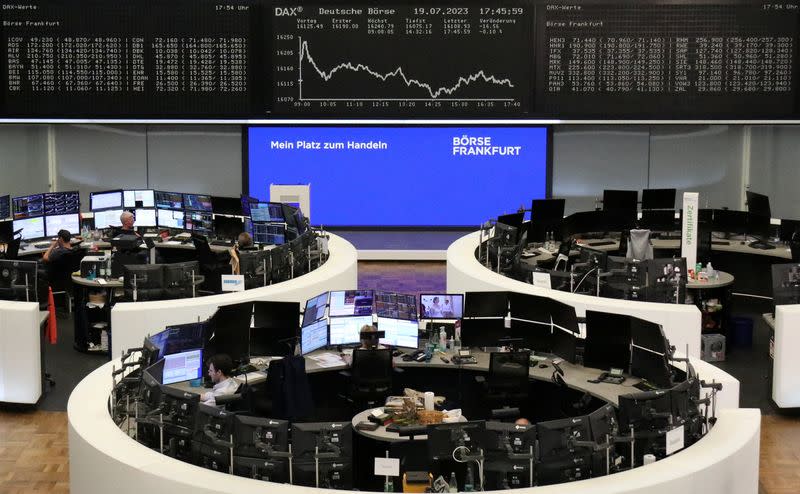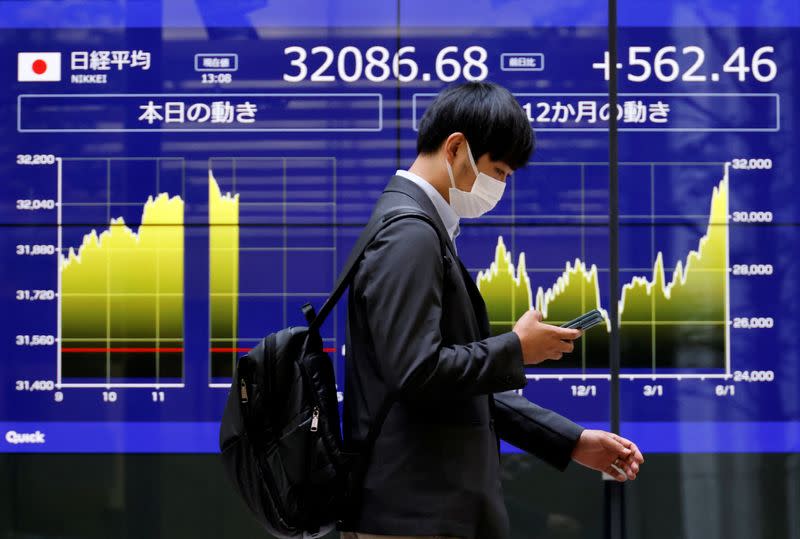Global shares slip, dollar soars vs yen on BoJ policy expectations
By Herbert Lash
NEW YORK (Reuters) -Global share markets edged lower on Friday as most U.S. megacap stocks slipped, while the dollar soared against the yen after Reuters reported the Bank of Japan is leaning toward keeping its dovish monetary policy next week.
Gold prices fell as the dollar rebounded to its highest in more than a week as investors prepare for next week's big central bank policy meetings, including the BOJ, the Federal Reserve and the European Central Bank.
The yen weakened 1.16% to 141.74 per dollar, while the dollar index, a measure of the greenback against major trading currencies, rose 0.29%.
The Dow eked out a gain to extend its winning streak to 10 sessions. But the Nasdaq fell and the S&P 500 barely rose, signs that the megacap tech and growth stocks that have driven the two indices respective 34% and 18% advances this year have stalled.
Garrett Melson, portfolio strategist at Natixis Investment Managers in Boston, said "you've seen a broadening out in the rally coming off narrow leadership," a reference to megacaps such as Microsoft Corp and Apple Inc.
More investors are now embracing the probability of a soft landing, with many companies well financed at lower interest rates so that higher rates - the Fed's terminal rate is expected to rise to 5.25%-5.5% next week - will not cause a credit crunch as in the past.
"This is an income-driven cycle as opposed to a credit cycle," said Melson. "Real incomes are growing as inflation cools and corporate and household balance sheets are very, very robust and have excess cash," he said.
"Bottom line, the odds for a soft landing are very strong."
The Dow rose 0.01%, while the S&P 500 gained 0.03% and the Nasdaq Composite slid 0.22%.
"The mood across equity markets is unequivocally that the worst is behind us," said Dec Mullarkey, managing director of investment strategy and asset allocation at SLC Management in Boston, though the Fed's credit tightening is creating cracks.
"None of them are happening with massive severity, but the longer we go on with higher rates, more and more that's going to come through," he said. "But again, big picture pretty good, but there are cracks."
A special rebalancing of the Nasdaq 100 that takes effect before Monday's opening may cause "quirky price action" in tech mega-caps, said Patrick Spencer, vice chair of equities at Baird in London.
The overhaul of the index to reduce its heavy weightings of the super megacaps, such as Microsoft and Apple, may exacerbate moves in these stocks during the ongoing earnings season, he said.
MSCI's U.S.-centric gauge of stocks across the globe closed down 0.2%, and the NYSE FANG+TM index, which includes the megacap stocks, slid 0.97%.
In Europe, the pan-European STOXX 600 index rose 0.32% to end the week higher as declining tech stocks were offset by gains in energy companies that tracked oil prices higher.
BOJ policymakers prefer to scrutinize more data to ensure wages and inflation keep rising before changing yield control policy, five sources familiar with the matter said. The report added there was no consensus within the central bank and the decision could still be a close call.
As Japanese inflation has stayed above the BOJ's target, traders have bet on the central bank ditching its yield curve control program, a move likely to cause the yen to strengthen.
"Markets were building up expectations which now look unlikely to play out," said Guillaume Paillat, a multi-asset manager at Aviva Investors.
Japan's benchmark 10-year government bond yield fell 5 bps to 0.41%, the lowest level since July 6, right before speculation for a hawkish tweak to policy this month began to ramp up.
The bond posted its biggest one-day fall since April.
In U.S. bond markets, Treasury yields mostly eased after spending Thursday braced for further Fed hawkishness in response to an unexpected drop in weekly unemployment claims.
The two-year Treasury yield, which typically moves in step with interest rate expectations, rose 0.7 basis points at 4.846%, while the benchmark 10-year yield fell 1.7 basis points to 3.837%.
Oil prices edged higher, buoyed by evidence of tightening supplies and economic stimulus in slow-recovering China.
U.S. crude rose $1.42 to settle at $77.07 a barrel and Brent settled up $1.43 at $81.07.
U.S. gold futures settled 0.2% lower at $1,966.60 an ounce.
(Reporting by Herbert Lash, additional reporting by Naomi Rovnick in London; Stella Qiu in Sydney; Editing by Conor Humphries, David Holmes and Marguerita Choy, Cynthia Osterman and Richard Chang)

 Yahoo Finance
Yahoo Finance 


